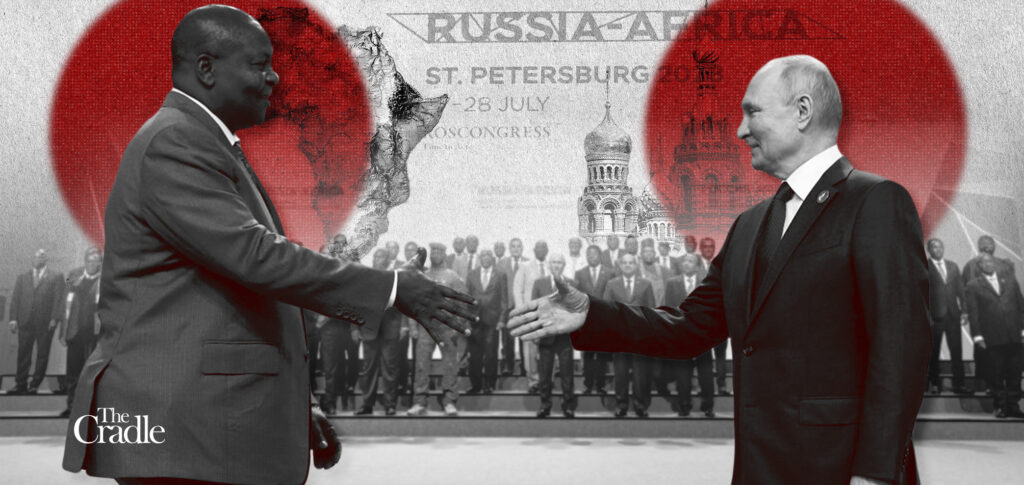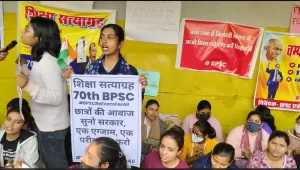Since the start of this year, Russia has shown a remarkable commitment to engaging with Africa, with Foreign Minister Sergey Lavrov making three visits to the continent. These diplomatic efforts underscore the increasing importance Moscow places on cooperation with African countries.
This was expressed by Russian President Vladimir Putin in his recent article published on the Kremlin website on 24 July under the title “Russia and Africa: Joining efforts for peace, progress and a successful future” where he stated:
“We highly value the honestly-gained capital of friendship and cooperation, traditions of trust, and mutual support that Russia and African countries share. We are brought together by a common desire to shape a system of relations based on the priority of international law, respect for national interests, indivisibility of security, and recognition of the central coordinating role of the United Nations.”
The response from African countries has been unprecedented, particularly evident at the second Russia-Africa summit held on 27-28 July. An astounding 49 out of 54 African nations actively participated in the summit, indicating a significant development in the relations between the two parties.
Russian interests in Africa
This heightened engagement comes in spite of the war in Ukraine, which reshaped the geopolitical landscape and emphasized the importance of expanding cooperation with Africa amidst the global competition for positions and influence.
The Russian Foreign Policy Concept, issued in late March, recognized the importance of “strengthening and deepening Russian-African cooperation in various spheres on a bilateral and multilateral basis.”
What makes Moscow’s outreach particularly noteworthy is that it extends beyond countries with immediate strategic interests or abundant resources. Notably, Russia has reached out to smaller African states, such as Eswatini, highlighting its intent to strengthen its influence and build a positive image across the entire continent.
The African response to Russia’s calls for closer ties has grown substantially. The Second International Parliamentary Conference “Russia-Africa” saw an increased participation of 40 delegations from African countries in March 2023, compared to 36 delegations in the previous conference held in 2019.
Similarly, the second Russia-Africa summit witnessed the attendance of 49 African nations in July, compared to 43 countries in the inaugural summit in 2019.
These developments are especially significant as African countries face mounting pressure from western powers to cut ties with Moscow due to the conflict in Ukraine. According to Kremlin spokesman Dmitry Peskov, western states, particularly the US and France, were exerting “unprecedented pressure” on African countries ahead of the Russia-Africa summit in St Petersburg.
Aid and Trade
Trade exchange between Russia and Africa increased between 2020 and 2022, after the first Russia-Africa summit, increasing from $14 billion to $18 billion, and is expected to double in 2030. While Russia’s trade with continental Africa is still relatively modest, four countries stand out as crucial partners: Algeria, Egypt, Morocco, and South Africa, accounting for 70 percent of the total trade.
Africa’s top trade partners
Despite being at the bottom of Africa’s list of trading partners and contributing only 1 percent of foreign direct investment to the continent, Russia’s Africa policy is evolving rapidly. The Kremlin has recognized the increasing importance of Africa and sought new partnerships globally while deepening existing cooperation in the face of massive western sanctions.
One significant effort by Russia to strengthen ties with Africa is its commitment to education. In 2023, Russia offered a record 4,700 scholarships to African students, a considerable increase from the 1,900 scholarships awarded in 2019.
Furthermore, Russia has emerged as the top arms supplier to Africa, accounting for 44 percent of major arms imports to the region between 2017 and 2021. This dominance surpasses other major players like the US (17 percent), China (10 percent), and France (6.1 percent).
Russian presence in Africa
At the recent Russia-Africa summit, President Putin emphasized Russia’s commitment to military-technical cooperation by signing agreements with over 40 African countries and providing them with various weapons and equipment. Some of these deals even involved providing aid free of charge, demonstrating Russia’s commitment to supporting African nations in their fight against terrorism.
Breaking free from neocolonial exploitation
In today’s rapid geopolitical transformations, Africa has emerged as an arena for competing major powers. Amidst this struggle for influence, Russia and African countries have found common ground in their shared interest to cooperate against western dominance.
Moscow positions itself as a leader of the anti-western resistance, while African states see an opportunity to break free from the shackles of western colonialism and assert their voices in shaping the new multipolar order.
To understand the dynamics of the current Russian-African relationship, historical context is essential. The legacy of western colonial policies remains a pivotal element in the cooperation between Moscow and African states.
Many African countries identify with Russia’s vision of a multipolar world, seeking a more equitable presence in global affairs. Russia deftly capitalizes on this anti-colonial sentiment, presenting itself as an attractive partner aligned with the interests of the Global South, particularly Africa.
Recent Russia-Africa summits have provided a platform for Moscow and its African partners to criticize the west openly. Leaders like Burkina Faso’s Brahim Traoré used strong anti-colonial rhetoric to emphasize the need to break free from neocolonial exploitation and resource extraction.
In addition to rhetoric, Russia backs its words with action. At the summit, President Putin canceled $23 billion of African debt and pledged increased Russian investment in the continent. Moscow also highlighted its commitment to African food security, contrasting western practices that prioritize developed countries over developing ones.
UN data shows that 45 percent of food exports from Ukraine, exported under the Black Sea Grain Initiative signed between Russia, Ukraine, the UN, and Turkiye, went to developed countries, compared to 49 percent to developing countries.
Only 6 percent of these exports went to the least developed countries, including African countries, the equivalent of approximately 1.4 million tons. Last year, Russia exported 11.5 million tons of cereal to Africa, and nearly another 10 million tons were delivered in the first half of 2023.
Seeking collaborative partnerships
The report from the Munich Security Conference in February highlighted a troubling trend for the west:
“Many countries in Africa, Asia, and Latin America have steadily lost faith in the legitimacy and fairness of an international system which has neither granted them an appropriate voice in global affairs, nor sufficiently addressed their core concerns. To many states, these failures are deeply tied to the west. They find that the western-led order has been characterized by post-colonial domination, double standards, and neglect for developing countries’ concerns.”
As a result, countries in the region are seeking new partners who will approach the relationship as a collaboration rather than a zero-sum game. They have found an appealing alternative in Russia’s engagement, particularly in President Putin’s rhetoric advocating for a fair representation of African countries in international forums like the UN Security Council and G20. Furthermore, Moscow’s commitment to reform global financial and trade institutions to better serve African interests has resonated with these nations, setting the stage for deeper cooperation.
The growing discontent with the western-led system and the allure of alternative partnerships have helped to forge closer ties between the Kremlin and many of Africa’s leaders. This may explain recent events in Niger and before that in Mali, where military coups have redirected the country’s foreign policy away from the west and, in particular former colonial ruler France.
Gaining ground in the Global South
The support of some African countries, such as Burkina Faso, Mali, and Guinea, for the coup in Niger, can be seen as a message of support for expelling the long-standing French influence and presence there.
In Russian geopolitical thought, Africa has become a region of increased importance and opportunity, necessitating stronger cooperation and multifaceted relations. Moscow’s approach to the African continent is built on three main pillars: enhancing influence through cooperation, emphasizing its leading position among anti-western countries, and investing in the region’s abundant resources.
Russia recognizes that the prevailing anti-western sentiment in Africa provides a unique opening to build alliances and advance the cause of liberation from colonial legacies. The ongoing conflict between Russia and the west extends beyond the confines of Ukraine and is now unfolding in various regions, including Africa.
President Putin has skillfully positioned himself as a leader of the resistance against western influence, effectively resonating with many countries in the Global South, including Africa. By aligning itself with Africa’s desire to break free from historical western dominance and colonial influences, Russia has gained significant ground.
(Courtesy: The Cradle, an online news magazine covering the geopolitics of West Asia from within the region.)




